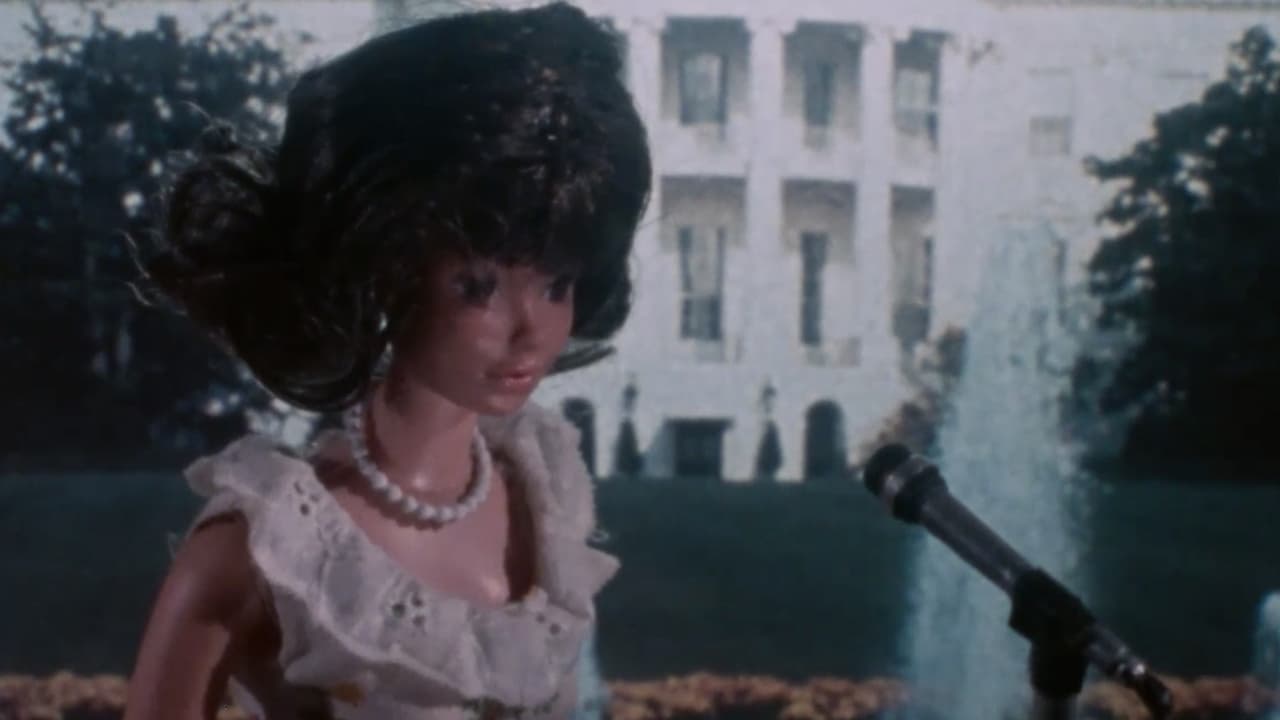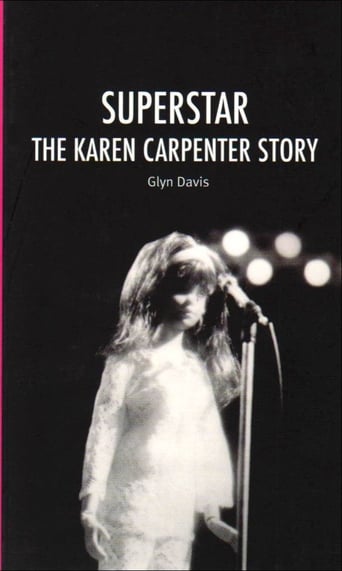WasAnnon
Slow pace in the most part of the movie.
Grimossfer
Clever and entertaining enough to recommend even to members of the 1%
Tyreece Hulme
One of the best movies of the year! Incredible from the beginning to the end.
Married Baby
Just intense enough to provide a much-needed diversion, just lightweight enough to make you forget about it soon after it’s over. It’s not exactly “good,” per se, but it does what it sets out to do in terms of putting us on edge, which makes it … successful?
tonymurphylee
In 1988, filmmaker Todd Haynes released a short film about Karen Carpenter's anorexia-related death. The entire film is, essentially, a reenactment of the events with the people being played by Barbie and Ken dolls. The entire film was more from the perspective of Karen Carpenter and is probably one of the most sympathetic portraits of her plight in existence. Unfortunately, the Carpenter family was none too happy about the film's release and, with the addition of several uncleared music rights, was banned from distribution. Superstar: The Karen Carpenter Story, found it's place in film viewing from the hundreds of bootlegs currently in circulation. The film's primary appeal, nowadays, is in the fact that it's such a controversial and illegal film. With the advent of the internet and of youtube, curious viewers can now watch the film online for free without having to pay for a bootleg copy with mixed quality. I have seen the film in question several times now and I consider it a fascinating first feature from a director that would later go on to receive tremendous acclaim for several of today's modern classics.There isn't a whole lot I want to say about the film, because part of the mystique of the film comes from viewing it. I do want to say, however, that it is as creative, disturbing, and interesting as everyone has heard. To say that it's a masterpiece of cult cinema is a bit of a stretch, but structurally the film is intelligent. It does have a rather slanted perspective. It's more about Karen Carpenter and her troubles. It paints a very fair portrait of her difficulties with fame, and as weird as it sounds you do feel really sorry and sad when watching her. The film's treatment of the rest of the characters, however, is a lot less fair. Richard Carpenter, her brother, is shown to be very fame-driven and rather selfish. Haynes, in fact, goes so far as to imply that his hesitations in revealing Karen's anorexia are out of fear of her outing him as a homosexual. Their mother is shown in an even more disturbing light. She is ignorant, small minded, loud, and stubborn, and comes across as very manipulative and controlling. However, the worst portrayal is of their father, who seems almost like a mockery of sitcom fathers of the late-50s. It's an ugly and spiteful portrayal, and to be perfectly honest if it were my family that Haynes was making a film about I would probably want to wring his neck. Putting aside the wrath of the script's treatment of the characters, however, it is only a reenactment and reinterpretation and I have seen far more mocking portrayals of famous people on several different made-for-TV movies (Man in the Mirror anyone?). I don't think that the Carpenter family should have taken Haynes so seriously, but I understand completely why they did. It's a well-known fact that Haynes, in order to properly portray Karen's weight problems, actually shaved off layers of plastic off of her Barbie doll avatar in order to graphically show her descent. In addition, he edits in footage of informal ads, television news audio, and graphic footage of holocaust victims. This is a much darker film than many would think.If there's anything wrong with this, it's that the impact of the film is weakened on repeat viewings. Once you get past the actual visual nature of the film, the dark tone, the graphic material of the footage, and the power of the music of the Carpenters in particular, there isn't much left to really dive into. This is really sad to me, because one thing that I can say with total confidence is that the depth Todd Haynes exhibits in terms of musical storytelling, visual power, multiple centered characters and character arcs, set pieces, genre manipulation, tone distortion, atmosphere, breaking of convention, and sound editing make his films some of the most re-watchable films in existence. Still, just because Superstar doesn't hold up does not mean that it is not worth seeing. It is a must-see film. Just don't bother watching it again, because once is enough.
jaredmobarak
There is something to be said about great music and the depths of hell it comes from. So many classic songs and albums were created under the influence of some drug, whether illegal or prescribed, or by a disorder of some kind, both mentally and physically. This is true of The Carpenters and their demise at the hand of lead singer Karen falling prey to an overdose of medication used to keep her anorexia going without the need of over-the-counter laxatives. Todd Haynes decided to create a bio-pic depicting the life of this tragic star and entitled it Superstar: The Karen Carpenter Story. Unfortunately, like most stories of this kind, it was pretty much widely agreed upon that her family life led to the troubles that eventually ended her life. Whether it the repressed childhood or over-protecting parents, the brother and partner more worried about her health killing his career than his sister, or the struggles of fame and the scrutiny the media places you under, Karen never could cope with the way her life progressed. Attempting to keep the wholesome façade on the surface, her dark inner struggles soon became the bigger news story and sadly just as memorable as her songs and amazing voice used to give them to the world.Unable to secure the rights to The Carpenters' catalog of music, Haynes has never been able to get this early short film out to the public in any legal way. Understandably, due to the representation of his character and family, Richard Carpenter filed an injunction against its release and the film may never be officially available. It's a real shame because there is a lot to like about the work … the least of which is the fact that it is all told with Barbie Dolls filling in as actors. There is no stop-motion animation going on here, but instead many static scenes blocked precisely to create interesting angles and the appearance of realism. Framed in a way to be able to move the figures when necessary, but still keeping the "performers'" hands off-screen must have been carefully orchestrated and choreographed. The amount of care definitely shows. Especially when you try and fathom the detailed sets and props all miniaturized to work in a Barbie Doll world. Quite inventive and as unique a thing as you'll ever see.The most interesting piece to take from viewing the film is how much it influenced Haynes' most recent release I'm Not There. Another musician biography, this time about the legendary Bob Dylan, it's told through the eyes of five different actors, each representing a different era in the singer's long and ever-evolving career. It's not just the fact of comparing the use of dolls to reenact the behind the scenes life with the use of multiple people containing widely differing ages and even both genders to do so, but the similarities of the actual style and construction. Haynes utilizes a lot of cut scenes and montages in Superstar, adding text blocks to explain facts on anorexia or to elaborate events in the Carpenters' life, showing archival footage of the Vietnam protests and Richard Nixon, or just letting idyllic suburbia fly past while a camera shoots out a car window. In I'm Not There he does the same, however, all with manufactured shots. The interviews or the switch from color to black and white occur with new film, everything created along with the script. Therefore, one could say the device is more successful here because he had to edit stock reels to make sense in the context of his story. From the food shots to the old-era movie scenes paralleling what was going on in the story, it all makes an eerie juxtaposition, adding just one more layer to an eccentric format that borders on the line between intelligent experiment and absurd miscalculation.Surprisingly, the acting is quite good also, with some effective voice work. I loved the almost horror film quality to narrator Bruce Tuthill's voice and in many scenes, like a later one involving Richard yelling at Karen, the emotions come across stronger than the lingering chance of breaking into laughter at the fact dolls are performing the visual accompaniment. Haynes, thankfully never allows himself to treat the gimmick as a pejorative comment on the true-life tale. He tells it all with an obvious attachment to the material and desire to let the facts become known. Karen Carpenter's life was constantly decided for her and she soon realized that the only aspect she had control over was her body. With all the fame and fortune being strewn upon her for her voice, she needed to find some control and unfortunately that meant a slow and steady descent into oblivion. Right from the start, when her mother suggests she sing for her brother's band to her sealing her fate of celebrity strife in a strongly metaphoric scene cutting to a record executives' outstretched hand—a deal with the devil if you may—Karen's life would never be the same. Thankfully we all still have the music to remember her by and maybe one day in the future, the world will be able to see her story told artistically and with care … even if plastic toys are doing all the work.
john-brouhard
There is not much I can add to Hanleymac"s comments except I hope Richard Carpenter can find a way to completely stop this mess from ever being seen ANYWHERE!!! GET, IF YOU CAN, "THE KAREN CARPENTER STORY, 1989. I think you'll find it much more informative, and that it deals with Karen's suffering more than "Superstar". It, as I recall, helped make all of us aware of the problems associated with Anorexia and other eating disorders. "The Karen Carpenter Story" doesn't free the Carpenter family from some responsibility for what happened to Karen, but it doesn't bash them either. The attempt on the part of Harold and Agnes was simply to try and protect them (Karen and Richard) from the problems of the entertainment world. If my wife, Terrie and I had been their parents, we might possibly have done things the same way. As for "Superstar, The Karen Carpenter Story", it should be sent as far away as the East is from the West.
overby
When I first heard of a Karen Carpenter movie acted out by Barbie dolls, I thought, "Yeah, right." Actually, it's not half-bad, revealing the ugly side of brother Richard and their parents. It's a shame the movie has been only available through the underground, though, as it portrays the heart-breaking effects of anorexia through clinical narration, montage, and pop culture to great effect. The use of dolls is actually ingenious, as we come to see how Karen was manipulated by her family, her record company, and society to conform to unattainable perfection. Although banned by numerous lawsuits, this film is available through alternative resources. If you look hard enough, you can find it.

